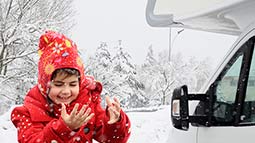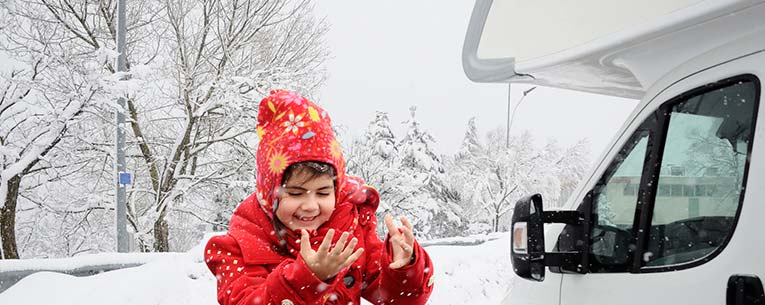There are so many fantastic things about the holiday season, from hot chocolate and home-baked cookies to beloved family traditions and the opportunity to spend time with the people you care about most. While almost everyone can appreciate a beautiful snowfall, "unpredictable winter weather" isn't high on the list of favorites for most of us, and for good reason.
RV travel is convenient, memorable and fun, but there are unique considerations you need to take into account when planning any holiday road trip with an RV.
Winterize It
The first steps you take should involve properly winterizing your vehicle. Winterizing is important even if you keep your RV in storage throughout the cold-weather months, since it prevents long-term damage and minimizes the work you need to do in the springtime to get your RV ready to roll again. Winterizing typically involves:
- Checking the bottom, sides and interior of your RV for any holes or air gaps. If you do find a gap, fill it with a sealant like silicone or foam to keep out cold air, and to prevent rodents from entering and doing damage.
- Protecting your RV's water system from freezing. Frozen and damaged water lines are the most common problem RV owners have with winter weather. Follow instructions in your owner's manual for water system winterizing, which will likely involve draining your water tanks, pressurizing the system and adding antifreeze.
- Minimizing damage from the sun's rays. To do that, close the blinds, and clean the outside of the vehicle including the fabric of your awning.
- Making sure your locks are in good working order. Apply spray lubricant to all of the locks and hinges of your RV, and keep a bottle of de-icer on hand in case any lock or door freezes shut.
Slippery Tire Tips
Fresh off the factory lines, RVs come equipped with "highway tread" tires, which are not appropriate for most winter driving conditions. Highway tread tires are designed to minimize noise and make driving smooth, but they do not excel at maintaining traction in snow and ice. To complicate matters, most RVs have rear-wheel drive, which makes it difficult to keep control when skidding.
If you'll be driving often during the winter, equipping your RV with snow tires can be a worthwhile investment, as can tire chains. Regardless of the tires you use, you should exercise even more caution when driving an RV in winter than you would in a smaller vehicle. Brake early and often, drive slower than you think you need to, take curves and turns very conservatively, and always pull over and wait it out if visibility becomes compromised.
Emergency Kit
A smart strategy for RV driving during the holiday season is to hope for the best and plan for the worst. In some cases, that may mean holing up a truck stop for several days until driving conditions are safe again.
If you do get stranded, you'll be much better off if you have emergency supplies with you. Here's a checklist to use for reference:
- Enough nonperishable food and water to last at least three days and up to a week
- Spare wiper blades, which should be replaced twice a year or every 6,000 miles
- De-icer for thawing frozen locks, hinges and doors
- Phone and charger
- Warm blankets and towels
- Tie-downs and bungee cords
- AC generator, electrical converter/charger and house batteries
- Shovel and ice scraper
- Flashlight
- First aid kit
- Pocketknife
- Extra antifreeze and fuel
- Basic toolkit (wrenches, pliers, screwdrivers, tape, wire cutters, etc.)
- Jumper cables
- Tarp
- Flares or glow sticks
Pulling Over
Anticipate what the weather might be like during your holiday trip by checking the radar and forecast ahead of time. The information you get won't be certain, but it will give you an idea of what to expect and how long the trip might take. Always leave earlier than you need to, allow for extra travel time and keep plenty of gas in the tank, even if weather conditions look great. If they don't look so good, consider postponing or even canceling your drive if possible.
There will be times when you're already on the road and the weather takes a turn for the worse. Pulling over is sometimes the safest choice for everyone on the road. If you can't see the vehicles in front of you, you're in an ice storm, you notice a lot of cars in the ditch, or you notice that your RV is skidding and becoming difficult to handle, get off the road by taking the next exit or simply pulling over. You should do the same if you feel tired and think there is any risk that you might nod off at the wheel.
To keep your RV as visible as possible to other drivers, keep your headlights on or turn on your flashers after you've gotten to the side of the road. Check weather radar on your phone or turn on your radio or TV to listen for updated weather conditions. Stay put until the roads are clear and safe again.
Weather is never easy to predict, but having the right insurance can save you a lot of headaches during holiday travel. Find out everything you need to know about travel insurance from Allianz, including coverage details and reasons to buy insurance for your next road trip.
Related Articles








Share this Page